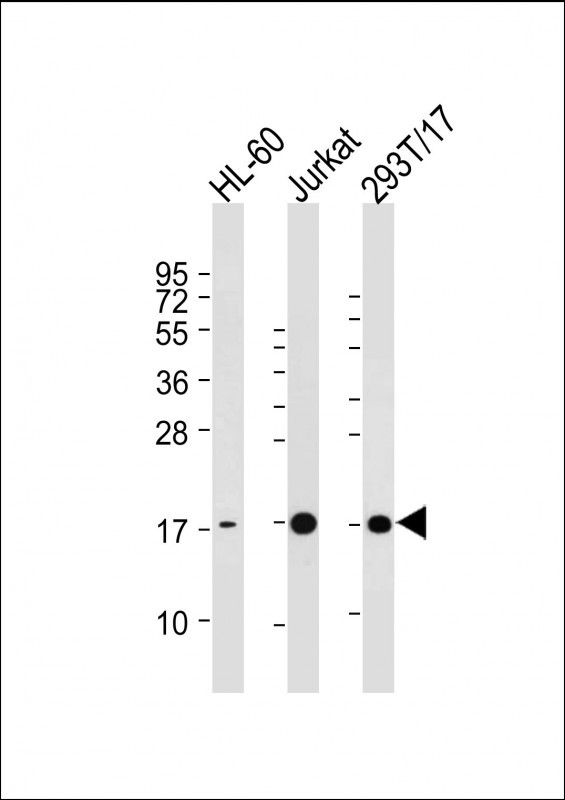SUMO3 Antibody
Purified Mouse Monoclonal Antibody (Mab)
- SPECIFICATION
- CITATIONS: 1
- PROTOCOLS
- BACKGROUND

Application
| WB, E |
|---|---|
| Primary Accession | P55854 |
| Reactivity | Human |
| Host | Mouse |
| Clonality | Monoclonal |
| Isotype | Mouse IgG1 |
| Clone/Animal Names | 76AT630.91.31 |
| Calculated MW | 11637 Da |
| Gene ID | 6612 |
|---|---|
| Other Names | Small ubiquitin-related modifier 3, SUMO-3, SMT3 homolog 1 {ECO:0000312|HGNC:HGNC:11124}, SUMO-2, Ubiquitin-like protein SMT3A, Smt3A, SUMO3 (HGNC:11124) |
| Target/Specificity | Purified recombinant GST-SUMO3 fusion protein was used as immunogen. |
| Dilution | WB~~1:2000 |
| Format | Purified polyclonal antibody supplied in PBS with 0.09% (W/V) sodium azide. This antibody is purified through a protein G column, followed by dialysis against PBS. |
| Storage | Maintain refrigerated at 2-8°C for up to 2 weeks. For long term storage store at -20°C in small aliquots to prevent freeze-thaw cycles. |
| Precautions | SUMO3 Antibody is for research use only and not for use in diagnostic or therapeutic procedures. |
| Name | SUMO3 (HGNC:11124) |
|---|---|
| Function | Ubiquitin-like protein which can be covalently attached to target lysines either as a monomer or as a lysine-linked polymer. Does not seem to be involved in protein degradation and may function as an antagonist of ubiquitin in the degradation process. Plays a role in a number of cellular processes such as nuclear transport, DNA replication and repair, mitosis and signal transduction. Covalent attachment to its substrates requires prior activation by the E1 complex SAE1-SAE2 and linkage to the E2 enzyme UBE2I, and can be promoted by an E3 ligase such as PIAS1-4, RANBP2 or CBX4 (PubMed:11451954, PubMed:18538659, PubMed:21965678). Plays a role in the regulation of sumoylation status of SETX (PubMed:24105744). |
| Cellular Location | Cytoplasm. Nucleus. Nucleus, PML body |
| Tissue Location | Expressed predominantly in liver. |

Provided below are standard protocols that you may find useful for product applications.
Background
SUMO proteins, such as SUMO3, and ubiquitin (see MIM 191339) posttranslationally modify numerous cellular proteins and affect their metabolism and function. However, unlike ubiquitination, which targets proteins for degradation, sumoylation participates in a number of cellular processes, such as nuclear transport, transcriptional regulation, apoptosis, and protein stability (Su and Li, 2002 [PubMed 12383504]).
References
SENP3-mediated de-conjugation of SUMO2/3 from promyelocytic leukemia is correlated with accelerated cell proliferation under mild oxidative stress. Han Y, et al. J Biol Chem, 2010 Apr 23. PMID 20181954. Association of mitotic regulation pathway polymorphisms with pancreatic cancer risk and outcome. Couch FJ, et al. Cancer Epidemiol Biomarkers Prev, 2010 Jan. PMID 20056645. The p150 subunit of CAF-1 causes association of SUMO2/3 with the DNA replication foci. Uwada J, et al. Biochem Biophys Res Commun, 2010 Jan 1. PMID 19919826. SUMOylation of nuclear actin. Hofmann WA, et al. J Cell Biol, 2009 Jul 27. PMID 19635839. Heat shock protein 27 is involved in SUMO-2/3 modification of heat shock factor 1 and thereby modulates the transcription factor activity. Brunet Simioni M, et al. Oncogene, 2009 Sep 17. PMID 19597476.
If you have used an Abcepta product and would like to share how it has performed, please click on the "Submit Review" button and provide the requested information. Our staff will examine and post your review and contact you if needed.
If you have any additional inquiries please email technical services at tech@abcepta.com.















 Foundational characteristics of cancer include proliferation, angiogenesis, migration, evasion of apoptosis, and cellular immortality. Find key markers for these cellular processes and antibodies to detect them.
Foundational characteristics of cancer include proliferation, angiogenesis, migration, evasion of apoptosis, and cellular immortality. Find key markers for these cellular processes and antibodies to detect them. The SUMOplot™ Analysis Program predicts and scores sumoylation sites in your protein. SUMOylation is a post-translational modification involved in various cellular processes, such as nuclear-cytosolic transport, transcriptional regulation, apoptosis, protein stability, response to stress, and progression through the cell cycle.
The SUMOplot™ Analysis Program predicts and scores sumoylation sites in your protein. SUMOylation is a post-translational modification involved in various cellular processes, such as nuclear-cytosolic transport, transcriptional regulation, apoptosis, protein stability, response to stress, and progression through the cell cycle. The Autophagy Receptor Motif Plotter predicts and scores autophagy receptor binding sites in your protein. Identifying proteins connected to this pathway is critical to understanding the role of autophagy in physiological as well as pathological processes such as development, differentiation, neurodegenerative diseases, stress, infection, and cancer.
The Autophagy Receptor Motif Plotter predicts and scores autophagy receptor binding sites in your protein. Identifying proteins connected to this pathway is critical to understanding the role of autophagy in physiological as well as pathological processes such as development, differentiation, neurodegenerative diseases, stress, infection, and cancer.

